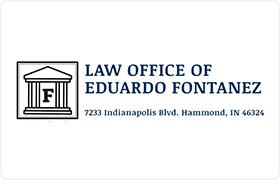Lowell Criminal Lawyer, Indiana, page 4
Sponsored Law Firm
-
 x
x

Click For More Info:
-
Law Office of Eduardo Fontanez
7233 Indianapolis Blvd Hammond, IN 46324» view mapCriminal Defense, Divorce & Family Law Former Judge & Former Deputy Prosecutor
I hope we can resolve any issue you may need. Here at the Law Office of Eduardo Fontanez, are focused on providing high-quality service and customer satisfaction.
800-697-7560
Jerome Michael Taylor
Family Law, Criminal, Personal Injury, Accident & Injury
Status: In Good Standing Licensed: 26 Years
Jerome Michael Taylor
Family Law, Criminal, Personal Injury, Accident & Injury
Status: In Good Standing Licensed: 26 Years
Kirsten L. Kaiser
Social Security, Workers' Compensation, Criminal, Medical Malpractice
Status: In Good Standing
Alan Dean Naggatz
Divorce & Family Law, Criminal, Bankruptcy & Debt, Accident & Injury
Status: In Good Standing Licensed: 31 Years
Isaac Isaiah Carr
Real Estate, Immigration, Estate, Criminal, Bankruptcy & Debt
Status: In Good Standing Licensed: 9 Years
 Eduardo Fontanez Hammond, IN
Eduardo Fontanez Hammond, IN Practice AreasExpertise
Practice AreasExpertise
